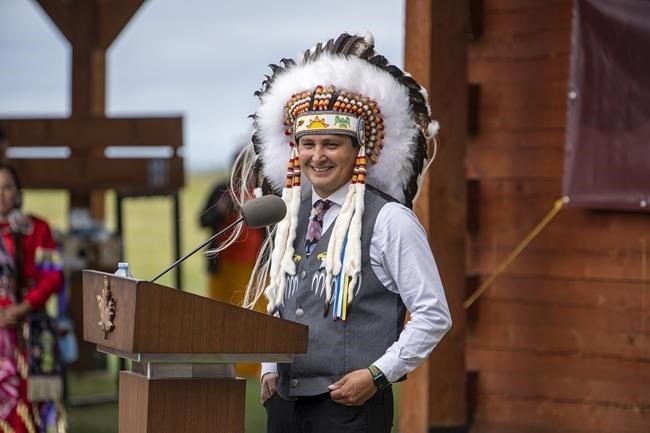Chief Cadmus Delorme's childhood home was less than 200 metres from the Cowessess First Nation's band office.
The building was a familiar place for the family. It's where patriarch Bruce Delorme worked as an elected councillor off and on until 2013.
Despite serving the community for decades, the elder Delorme was wary when his son decided to run for chief in 2016.
"At the time, my dad didn't know if politics was going to rise me up to who he (knew) I could be or tear me apart, as politics sometimes does, so I entered it very cautiously," Delorme, 39, said in an interview with The Canadian Press.
He had to face one of the hardest moments as chief when the Saulteaux community made international headlines last month with the discovery of potentially 751 unmarked graves near the former Marieval Indian Residential School.
Shortly after, Cowessess made headlines again as the first First Nations community to sign an agreement with Ottawa that returns jurisdiction over children in care to the community. Federal legislation overhauling Indigenous child welfare was passed in 2019 and came into force last year.
Prime Minister Justin Trudeau, Premier Scott Moe and Delorme signed the agreement at the community's powwow grounds on July 6.
Tim Bear stood behind his youngest brother and watched him address band members and other dignitaries on the historic day. He says it was a proud moment for the family.
"We always knew Cadmus was destined for great things."
Born to residential school survivors, Delorme is the youngest of nine siblings. As a child, he was diagnosed with an allergy to cow's milk so his parents gave him goat's milk, which led to the nickname "Goat Man."
He spent his time between Cowessess and his mother's home community of Ochapowace Nation in southern Saskatchewan.
The family home was open to anyone in need, whether it was a meal or a safe place to stay.
"We weren't money rich. We were just rich with love around us," Delorme says.
His father originally wanted him to become a professional golfer.
Delorme started visiting the Cowessess golf course as a child. He didn't know much about the game, so he spent his time searching the course for discarded golf balls to sell. He used the money to buy fries and gravy.
When he was 12, he decided to pick up the clubs. That sparked an amateur career across Canada. He became so accomplished he acquired another nickname: "Can't Miss." In 2011, he won the Saskatchewan Mid-Amateur men's golf championship.
Eventually Delorme followed a different calling.
He enrolled at the First Nations University of Canada where he says an Indigenous governance class awoke the "warrior spirit" in him.
He took on various roles with the student association. In 2010, federal and provincial governments pulled funding over questionable spending by school officials. Delorme was among students who met with officials to try to keep the university's doors open.
Haris Khan remembers first meeting Delorme during that time. Khan worked on the board of directors for the University of Regina Students' Union. He says the two bonded over their shared passions for human and social justice.
"(Cadmus) is always working for a positive change," says Khan, who fondly refers to Delorme as a "cousin."
Delorme completed a master's degree in public administration in 2016. The next day, he was elected chief of Cowessess at the age of 34. He was re-elected in 2019.
The first term brought challenges. Delorme went forward with a motion to transfer privately owned agricultural land back to the community. It was a move many disagreed with, including some councillors, but his decisions as a leader are always for the betterment of the First Nation's future, he said.
"Everything is for that long-term goal of Cowessess to be self-governing, to have strong economic self-sustainability, to control our political sovereignty and to focus on cultural rejuvenation."
Bear says his brother wears many hats, but the best one is as a father. "That meant the world to him."
Delorme and his wife Kimberly are parents to three young children and also take care of her 14-year-old brother.
"My kids have been the best medicine for me for the past few years, because they make me realize how important this work is to me now," Delorme says.
When he's not working, he likes to run, do yoga or camp with his family. He has started listening to audio books and favours content related to mental health and Indigenous history.
Delorme has about two years left in his term. When asked if his future could include provincial or federal politics, he laughs and says he's just enjoying the journey he's on.
"Whatever role I play, I plan on being Cadmus through and through."
This report by The Canadian Press was first published July 13, 2021.
Brittany Hobson, The Canadian Press

